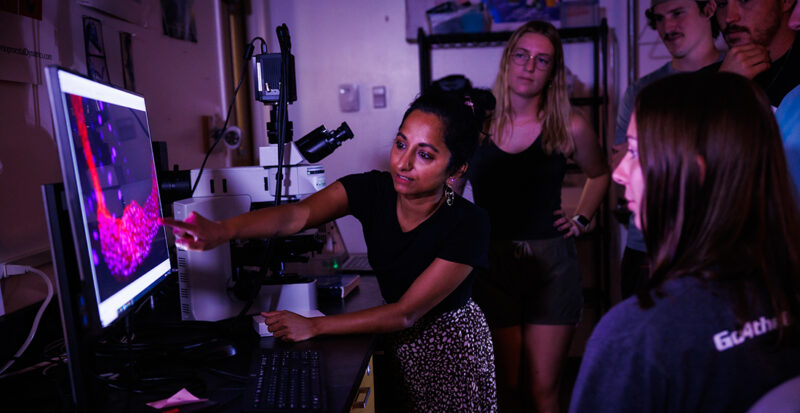Undergraduate
Neuroscience
Ask new questions and take innovative steps further to understand brain function in this rapidly evolving study area.
Neuroscience
The Neuroscience Major trains students to use the knowledge of several academic disciplines to achieve an in-depth understanding of the human nervous system and its purpose.
This program accomplishes this through a program of instruction that includes training in modern laboratory and research techniques and collaboration with faculty mentors. Upon completing the program, students will be well-prepared for careers and graduate study in neuroscience and related disciplines. The Neuroscience Major accomplishes its mission through the interdisciplinary exploration of science’s most challenging puzzle – the brain.
Major areas of study include anatomy and physiology, cellular and molecular biology, cognitive psychology, and neurological disorders. These disciplines can enhance our understanding of neural structures and systems controlling functions such as vision, memory, emotion, movement, and, ultimately, all of human behavior.
View major course requirements
Why Simpson College for Neuroscience?

What Will You Learn?
Neuroscience is an interdepartmental program with the Department of Psychology and the Department of Biology & Environmental Science. By pursuing this major, you will have an enhanced understanding of the neural structures and systems controlling functions such as vision, memory, emotion, movement, and, ultimately, all of human behavior.
Get Hands-On Experience

Work in the Cognitive Neuroscience Lab
Under the direction of psychology and neuroscience faculty, you can join teams of undergraduate researchers in the Cognitive Neuroscience Lab to identify and plan projects, run data collection sessions, prepare and analyze the data, and write and present the results. You have a variety of research tools at your disposal.
There are five general-purpose cognitive psychology research stations, each equipped with E-Prime laboratory software, Matlab, and the SPSS statistical analysis package. Advanced psychophysiology measurement equipment records muscle activity (EMG), skin temperature, and skin conductance (EDA). A 24-channel Electroencephalogram (EEG) data acquisition system studies brain activity related to music, language, and attention.
The location of eye fixations is closely related to what the brain is attending to and processing at any given moment, so we added an SMI Red 500 eye-tracking system. It includes eye-tracking glasses that can be worn while shopping, driving, and many other activities that can’t be reproduced in the lab.
This Is What Success Looks Like

What I learned as a student that was super important was that if you want to solve a big problem, it has to be interdisciplinary.
Ryan Skaar '17
Research sparks Simpson startup
Read this StoryVarious Research Options Help Build Essential Career Networking Opportunities

Simpson has numerous [research] options and can help get you connected with programs at other locations.
Matt Turnley '20
Three unique Exploreships helped Matt Turnely ’20 sharpen his passion for wildlife conservation and continue his education at BYU
Read this StoryLearn the Important Balance of Education and Extracurriculars

I feel prepared [for dental school] because I was able to learn effective time-management skills from balancing my classes and extracurriculars at Simpson.
Brendan Owings '20
Balancing extracurricular activites with coursework helped prepare the former student-athlete for the dental program at the University of Missouri-Kansas City
Read this StoryNeed Assistance? Contact us!
- ryan.rehmeier@simpson.edu
- 515-961-1823
- Carver Science Center
- Monday - Friday, 8 a.m. - 4:30 p.m.
Meet Our Faculty

Lauren Points
- Assistant Professor of Biology

Taylor Vargo
- Assistant Professor
- Psychological Sciences
- Neuroscience

